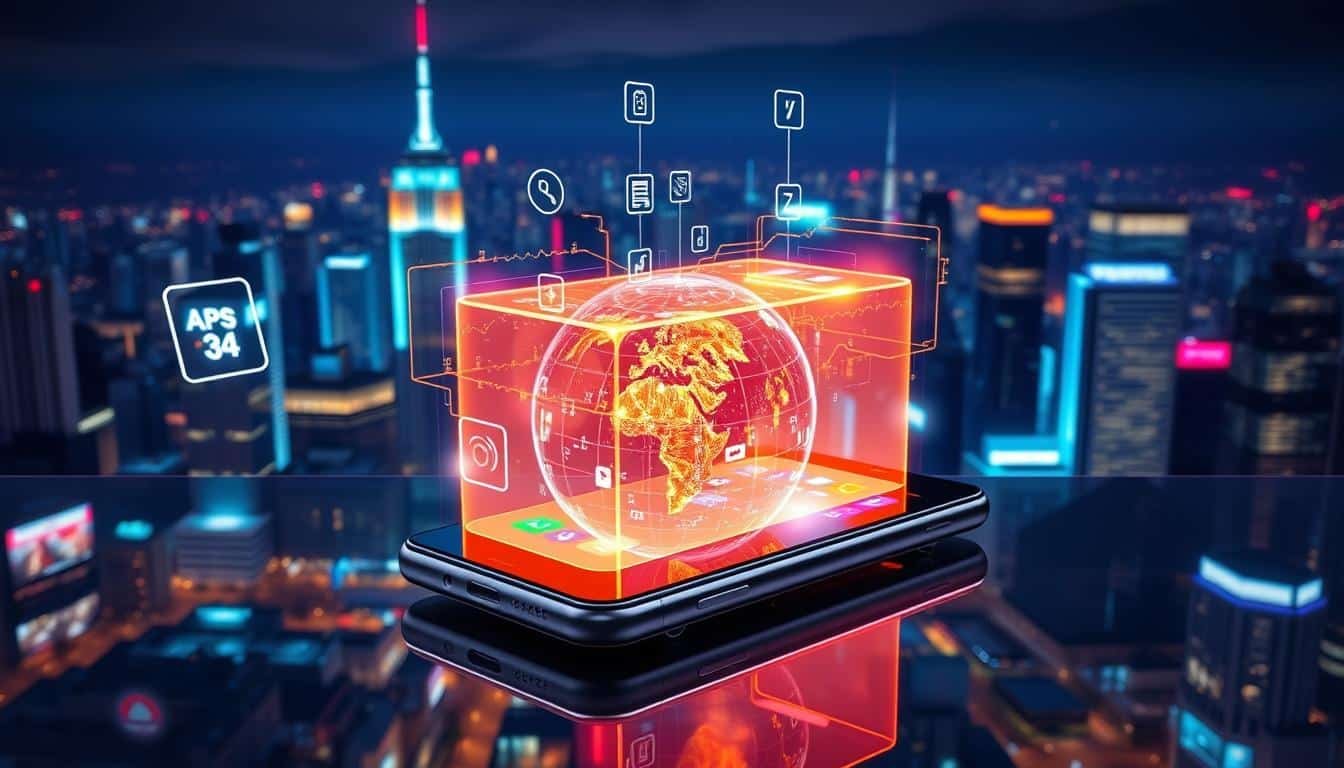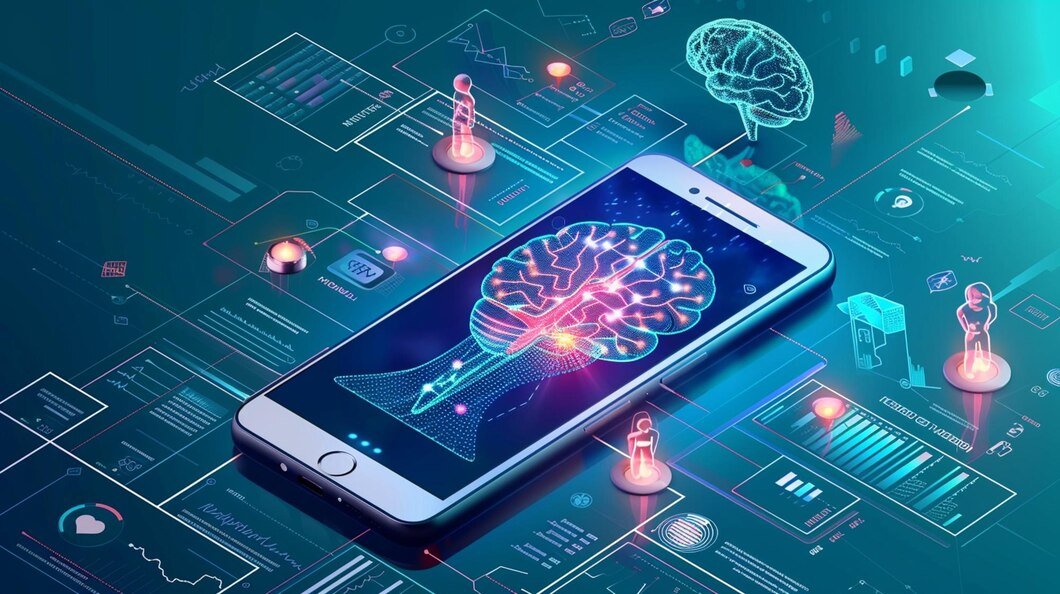Mobile technology has changed our digital world a lot. It lets us connect more, have personalized experiences, and change how businesses work. Now, most adults spend about 34 years of their life looking at screens. These devices are a big part of our daily life, helping us shop online and control our homes from afar.
Mobile tech has made getting information easier and has brought people together worldwide. It has changed how businesses work, making them focus more on mobile users. Now, mobile devices do many things, like controlling our smart homes.
Also, mobile tech has changed how we find information and make choices. The future looks bright, with even more ways to make our devices work for us. This will keep changing how we live in the digital world.
Key Takeaways
- Mobile technology has revolutionized our digital world, enabling greater connectivity and personalized experiences.
- Smartphones and tablets have become ubiquitous, integrated into our daily lives and facilitating a wide range of tasks.
- Mobile technology has empowered access to information, bridging the digital divide and connecting people and communities worldwide.
- Businesses have been transformed, with mobile-first strategies and the ability to revolutionize customer interactions.
- Mobile technology has evolved into a multifunctional device, consolidating multiple gadgets and integrating smart home capabilities.
- Mobile technology has empowered access to information and context-aware intelligence, reshaping how we acquire knowledge and make decisions.
- The future of mobile technology promises even greater integration and personalization, continuing to reshape our digital landscape.
Embracing the Era of Mobile Connectivity
The rise of smartphones and tablets has changed how we live. These devices are now key parts of our daily life. They let us shop online, control our homes from afar, and more. Smartphones and tablets have made many gadgets into one, making life easier.
The Rise of Smartphones and Tablets
Mobile technology has changed how we see the world. It keeps us connected, lets us work and play anywhere, and changes how we get information. As mobile technology gets better, it will make our lives even more personalized and connected.
Mobile Technology: Facilitating Daily Life
Mobile apps and devices have become essential for daily tasks. Smartphones and tablets combine many functions into one, making life easier. This has changed how we use mobile devices for communication, information, and managing our lives.
| Device Type | Functionality | Connectivity |
|---|---|---|
| Smartphone | Multipurpose computing, communication, and entertainment | Cellular, Wi-Fi, Bluetooth |
| Tablet | Portable computing, media consumption, and productivity | Wi-Fi, Cellular (optional) |
The mobile technology world is always changing. It will bring us more personalized and seamless experiences. This will help us stay connected and productive wherever we go.
Empowering Access and Connectivity

Mobile technology has changed how we get information and connect with others. Smartphones and tablets have made the internet cheaper and easier to get to, especially in places without good internet before.
Bridging the Digital Divide
Now, more people can join the digital world, no matter where they live or their financial situation. Mobile devices are cheap and easy to carry. This lets people in far-off or less connected places get the same info and chances as those in big cities. It helps make society more equal.
Connecting People and Communities
Mobile tech makes it easy for people all over the world to talk and work together. Through apps and online platforms, folks can share news and chat in real-time. This breaks down old walls and helps create new global networks and groups.
| Feature | Benefit |
|---|---|
| Ubiquitous Mobile Connectivity | Enables people to stay connected and access information from anywhere, anytime. |
| Diverse Mobile Applications | Provides a wide range of tools and services to cater to various needs and interests. |
| Seamless Data Sharing | Allows for the instant exchange of information, ideas, and media among users. |
Mobile technology’s effect on giving us access and connections is clear. It’s closing the digital gap and linking people and groups across the globe. Mobile devices are now key for improving life and work everywhere.
Personalized Mobile Experiences
Mobile technology has changed how we use information and interact with the world. Smartphones and tablets are now key for accessing content and managing our lives. We can make these mobile devices our own by customizing settings, apps, and content.
Now, we get news and music tailored just for us, and services that know where we are. Mobile technology makes our lives more personal. It changes how we get information, talk to others, and handle work and personal tasks.
Thanks to smartphone technology and mobile apps, we control our digital lives like never before. We can set up our devices, pick apps, and find content that fits our interests. This makes our daily tasks easier, keeps us connected, and boosts our happiness and efficiency.
As mobile technology gets better, making our mobile experiences more personal will grow. We’ll see more voice-controlled helpers and interfaces that adapt to us. The future of mobile technology looks bright, offering more tailored and smart experiences for everyone.
Mobile Technology: Transforming Businesses
Mobile technology has changed how businesses work. It has made customer interactions better and led to mobile-first strategies. Now, smartphones and tablets are key for customers to connect with brands. They use them for online shopping, mobile payments, and getting real-time info and support.
Revolutionizing Customer Interactions
Mobile devices are now a big part of how customers interact with brands. They let businesses give personalized and smooth experiences. Customers can now easily research products, make purchases, and get support right from their sdevice>. This has made the whole process smoother.
Features like mobile apps, mobile-optimized websites, and mobile payments have changed how businesses reach out to customers. This has built stronger relationships and made customers more loyal.
The Emergence of Mobile-First Strategies
Because of the rise of sdevice>, businesses are now focusing on strategies. This means making mobile experiences a top priority over desktop ones. This shift has led to better sapp> and mobile websites that meet the needs of sdevice> users.
By going mobile-first, businesses can keep up with what modern consumers want. They can deliver the smooth and engaging experiences that people expect.
| Benefits of Mobile-First Strategies | Challenges of Mobile-First Strategies |
|---|---|
|
|
is changing the future of business. Forward-thinking companies are using sdevice> to improve customer interactions and innovate. By focusing on mobile-first strategies, businesses can lead the way. They can give the smooth and engaging experiences that today’s consumers want.
The mobile technology Evolution: A Multifunctional Device

Mobile technology has changed smartphones and tablets into all-in-one devices. They now handle many tasks, making our digital lives easier. These devices have taken over from old gadgets, giving us a smooth digital experience.
Consolidating Multiple Gadgets into One
Smartphones and tablets are now key for many tasks that used to need separate devices. They’ve replaced cameras, music players, GPS, and even e-readers. Now, we have one device for everything.
Integrating Smart Home Capabilities
IoT (Internet of Things) technology has made mobile devices even more powerful. We can use our phones and tablets to control smart home devices. This includes lights, temperature, security, and more. It’s changed how we live, making things easier and more convenient.
As mobile technology keeps getting better, we’ll see more things merged into one device. The future looks bright for mobile computing. We’ll enjoy a seamless digital life where one device manages everything we do at home, work, and play.
“The smartphone has become the central hub of our digital lives, consolidating a wide range of functionalities into a single, powerful device.”
mobile technology: Empowering Knowledge and Information

Mobile technology has changed how we get and use information. Smartphones and tablets are key tools, giving us instant access to lots of knowledge. They let us research topics and keep up with news, changing how we learn and stay informed every day.
Instant Access to Information
With mobile tech, we can quickly search and get information anywhere. A few taps on the screen let us find answers, learn new things, and stay current. This quick info access boosts productivity, helping us make smart choices and learn more all day.
Context-Aware Intelligence
Mobile devices are getting smarter, using artificial intelligence and internet of things (IoT) for better insights. They can understand what we like, where we are, and what we do. This means they can give us personalized tips, reminders, and help that fits our needs. This smart tech helps us make better choices and improve our daily lives.
As mobile tech keeps getting better, getting information and knowledge when we need it will get easier and more powerful. Mobile computing, connectivity, and smart technology have changed how we use, process, and apply information. This has a big impact on our personal and work lives.
| Advantages of Mobile Technology for Information Access | Disadvantages of Mobile Technology for Information Access |
|---|---|
|
|
Also Read : How Does Network Infrastructure Impact Performance?
Conclusion
Mobile technology has changed our digital world a lot. It has changed how we connect, get information, and do business. Smartphones and smart home devices are now a big part of our daily lives.
Mobile connectivity has given power to people and communities. It has closed the digital gap, giving more people access to knowledge and chances. Businesses now use mobile to change how they talk to customers and have mobile-first plans to lead in the digital world.
The growth of mobile technology is still going strong. As devices get more features and understand our needs better, we can expect more personalized and smart experiences. The future of mobile looks exciting, promising to change how we live, work, and interact with others.
FAQs
Q: What are the benefits of mobile technology in our daily lives?
A: The benefits of mobile technology include enhanced communication through mobile devices, easier access to information via mobile applications, and improved convenience for tasks like mobile payment and online shopping. Additionally, mobile health applications provide healthcare providers with tools to monitor patient health remotely.
Q: How has the evolution of mobile technology impacted our communication methods?
A: The evolution of mobile technology has transformed mobile communication by introducing faster networks such as 4G and 5G, allowing for seamless video calls and instant messaging through various mobile apps. This has enhanced interpersonal communication and made it more accessible from anywhere.
Q: What is the role of mobile applications in the Internet of Things (IoT)?
A: Mobile applications play a crucial role in the Internet of Things (IoT) by enabling users to control and monitor IoT devices through their mobile phones. These apps facilitate the communication between mobile devices and IoT technology, allowing for automation and improved efficiency in daily tasks.
Q: What should I consider when developing a mobile application?
A: When developing a mobile application, consider the target operating system (iOS or Android), user experience design, security features, and the type of mobile functionality you want to include. It’s also essential to focus on app development best practices to ensure smooth performance and user engagement.
Q: What are some common types of mobile devices?
A: Common types of mobile devices include smartphones, tablets, and wearable technology such as smartwatches. Each type of mobile device offers unique features and capabilities, catering to different user needs and preferences.
Q: How does mobile security affect the use of mobile technology?
A: Mobile security is critical in protecting user data and privacy when using mobile technology. With the rise of mobile payments and personal information storage on mobile devices, robust security measures must be implemented to prevent unauthorized access and data breaches.
Q: What is the significance of the mobile operating system in mobile technology?
A: The mobile operating system is significant as it serves as the backbone for mobile devices, enabling the execution of applications and management of hardware resources. Popular mobile operating systems include Android and iOS, each offering unique features and app development environments.
Q: How do wearable technology and mobile health applications complement each other?
A: Wearable technology and mobile health applications complement each other by allowing users to track their health metrics and communicate data to healthcare providers in real-time. This synergy enhances patient care and promotes proactive health management.
Q: What are the advantages and disadvantages of using mobile technology?
A: Advantages of using mobile technology include increased connectivity, convenience, and access to information. Disadvantages may include security risks, potential distraction, and dependence on devices. Understanding these factors is essential for responsible use of mobile technology.




